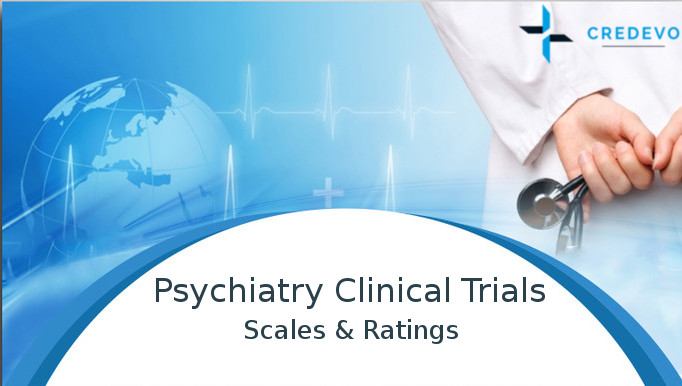Psychiatry Clinical Trials: Expertise and Training in Scales / Ratings

Psychiatric illnesses represent one of the most important segments for drug development in the last several decades1. They are among the leading causes of ill-health and disability worldwide with about 450 million people currently suffering2. One in 5 adults experiences a mental health condition every year3.

Drug Development in Psychiatry
No wonder, leading pharmaceutical companies have engaged themselves in research, development, manufacturing, and marketing of psychiatry-related medications. These include Roche, Pfizer, Forest, and Lilly, besides the plethora of generic companies in the market that are actively bringing generic versions of medicines for CNS disorders.
- Psychiatric medicines have been growth superstars for more than a decade, generating billions for their makers4. As per the IMS data, mental health prescriptions were the second highest from 2010-2014 in USA5. [Recent news about IMS’ entry into clinical research]
- Psychiatry remains one of the most active therapeutic segments for research with all major CROs engaging in clinical trials on psychiatry related medicines. [Read about recent changes in CROs dynamics].
- In June 2017, clinicaltrials.gov reports about 5000 active clinical trials being conducted worldwide in this sector6. Thousands of sites and investigators worldwide are involved in the recruitment, treatment and follow up of patients in these clinical trials.
Ratings and scales in psychiatry clinical trials
Talking about psychiatry clinical trials, one can hardly ignore the importance of ratings and scales in this sector. Being a field associated with human behavioral aspects, clinical investigators have to follow standardized tools for assessments of patients.
Scales and ratings provide an excellent way for this standardization. However, to minimize any subjective variation in these assessments, a lot of emphasis is given on training and building experiences.
For 3 big segments in psychiatry: namely, schizophrenia, depression, and bipolar disorders, the most commonly used scales are as follows
Schizophrenia and psychosis
- Brief Psychiatric Rating Scale (BPRS)
- Calgary Depression Scale for Schizophrenia (CDSS)
- Positive and Negative Syndrome Scale (PANSS)
- Scale for the Assessment of Positive Symptoms (SAPS)
- Scale for the Assessment of Negative Symptoms (SANS)
Depression
- Beck Depression Inventory (BDI)
- Centre for Epidemiological Studies – Depression Scale (CES-D)
- Center for Epidemiological Studies Depression Scale for Children (CES-DC)
- Edinburgh Postnatal Depression Scale (EPDS)
- Geriatric Depression Scale (GDS)
- Hamilton Rating Scale for Depression (HAM-D)
- Kutcher Adolescent Depression Scale (KADS)
- Montgomery-Åsberg Depression Rating Scale (MADRS)
- Zung Self-Rating Depression Scale
Mania and bipolar disorder
- Bipolar Spectrum Diagnostic Scale
- Child Mania Rating Scale
- General Behavior Inventory
- Mood Disorder Questionnaire (MDQ)
- Young Mania Rating Scale (YMRS)
Expert suggestion
These scales are particularly useful for endpoint assessments in clinical trials. Dr. Vaishal Vora, a famous clinical trial investigator and expert rater for psychiatry clinical trials consider them critical for a standardized global assessment of psychiatry clinical trials. Dr. Vora has been trained in many of these scales and ratings by internationally reputed companies, like Bracket Global and ProPhase.
Dr. Vora, who has conducted more than 30 clinical trials in the psychiatry segment as an investigator, has the following tips to offer with regard to utilizing rating scales in psychiatry.
- Training in ratings and scales is essential before every clinical trial to ensure consistency in administering them. This ensures to avoid subjectivity and bring uniformity in assessments.
- Best way of getting trained is face to face interview with the scale administrator. Only a person who has acquired a thorough understanding in application of scale provide such expertise. Particularly, since the scale is just not as simple as it sounds.
- Training can be intensified if multiple videos are created without revealing identity of patient. Furthermore, only real patient can provide real information not the actors, who are mostly used in training. Each individual items in scales can be highlighted one by one by giving relevant examples we commonly come across in our clinical practice.
- Inter-rater variability should not be underestimated, while training. In other words, we should keep unbiased mindset to avoid placebo response.
- In order to do so, it’s best to not keep expectations of any findings, positive or negative. One patient should be rated by two different psychiatrists for the first time when we rate patient from same site. Later on with consent of both of them a rater can take charge.
- Clinical judgement and experience of psychiatrist are also important factors worth considering in usual training. Scale specifications can be better implemented, if clinical judgement is effectively utilized too. For example, in patient of Schizophrenia, we are quite sure that there is no chance to find Delusion of Grandiosity, but it is included in PANNS. In situations like this, it may be very useful to allow scale administrator to use their own logic while applying the scale.
- One significant factor is difference of presenting symptoms and signs in different cultures. Cultural differences are very likely to cause different interpretations of signals. It should be useful to include book picture of patients from specific regions. So, training can be different for different countries. We need special language experts who can easily explain the circumstances where we can modify our final score.
- With significant rise in suicidal tendencies and related cases, it’s also recommended to include Columbia Suicide Severity Rating Scale (C-SSRS) in training. We use it in our routine practice because suicide is not only common, but very difficult to predict as well.
- Another area to include is Obsessive-Compulsive Disorder (OCD). In recent times, focus given to OCD has been insufficient. Y-BOCS is an important scale we should use to quantify severity of OCD. We encounter many problem in treatment resistant OCD, when our focus is more on medical treatment rather than Cognitive behavioral therapy (CBT).
To contact Dr. Vora for all clinical trial related matters, please click here.
References
- http://www.namihelps.org/assets/PDFs/fact-sheets/General/What-is-Mental-Illness.pdf
- http://www.who.int/whr/2001/media_centre/press_release/en/
- https://www.nami.org/Learn-More/Mental-Health-Conditions#sthash.qpbGFPP5.dpuf
- http://www.fiercepharma.com/sales-and-marketing/pfizer-forest-and-lilly-dominate-top-10-ranking-of-psych-meds
- https://www.imshealth.com/files/web/IMSH%20Institute/Reports/Medicines_Use_and_Spending_Shifts/Medicine-Spending-and-Growth_1995-2014.pdf
- https://clinicaltrials.gov/ct2/results?term=%22Schizophrenia%22+OR+%22Depression%22+OR+%22Bipolar%22+OR+%22Psychiatry%22+OR+%22Anxiety%22&Search=Search